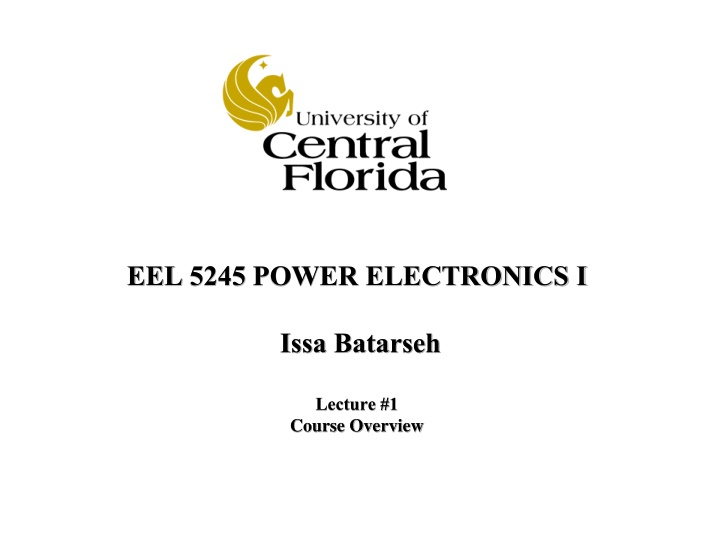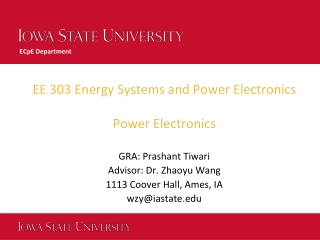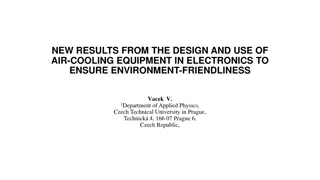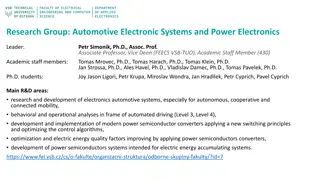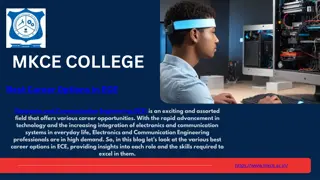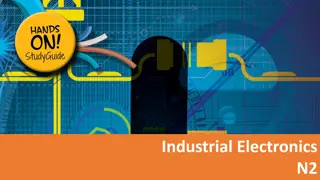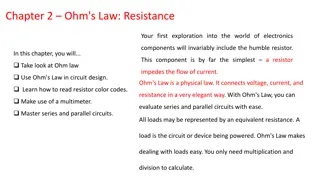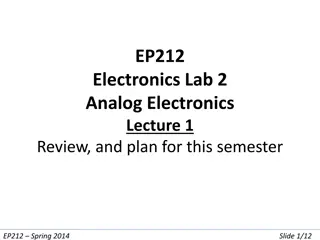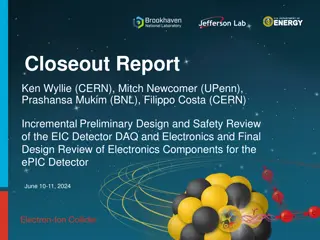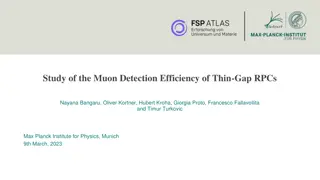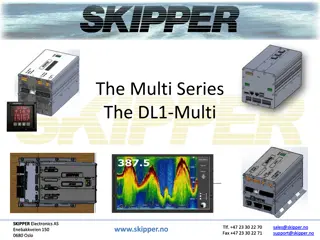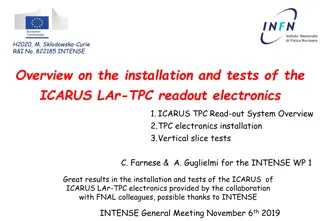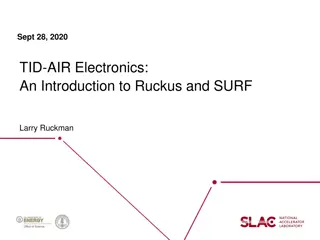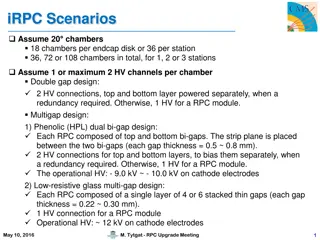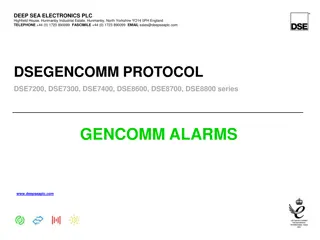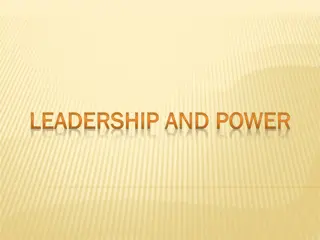Power Electronics I - Course Overview and Topics
This course overview covers key information about EEL 5245 Power Electronics I taught by Dr. Issa Batarseh. It includes syllabus review, instructor details, covered topics, and academic assignments. The course focuses on principles of power electronics, semiconductor devices, and converter topologies with an emphasis on analysis and design techniques for switch-mode converters. Explore the agenda, objectives, and textbook references to understand the course structure and expectations.
Download Presentation

Please find below an Image/Link to download the presentation.
The content on the website is provided AS IS for your information and personal use only. It may not be sold, licensed, or shared on other websites without obtaining consent from the author.If you encounter any issues during the download, it is possible that the publisher has removed the file from their server.
You are allowed to download the files provided on this website for personal or commercial use, subject to the condition that they are used lawfully. All files are the property of their respective owners.
The content on the website is provided AS IS for your information and personal use only. It may not be sold, licensed, or shared on other websites without obtaining consent from the author.
E N D
Presentation Transcript
EEL 5245 POWER ELECTRONICS I Issa Batarseh Lecture #1 Course Overview
Agenda Welcoming remarks Syllabus Review Course Topics Questions Your Academic Assignment Due by this Sunday.
POWER ELECTRONICS I EEL 5245 - FALL 2018 Instructor: Office: Office Hours: Phone: Dr. Issa Batarseh HEC 204 M, W 10:15 - 11:45 PM Work: 407-823-0185 Cell: 407-962-8630 issa.batarseh@ucf.edu MW 9:00 10:15 AM ENG1 386A Power Electronics - Circuit Analysis and Design I. Batarseh and H. Harb, Springer, 2018. Email: Class Hours: Class Room: Textbook: https://link.springer.com/book/10.1007%2F978-3-319-68366-9 References: 1. Fundamentals of Power Electronics, Erickson and Maksimovic, 2001 2. Power Electronics: Converters, Applications and Design, Mohan, Undeland and Robbins
Syllabus Review Catalog Description: Principles of power electronics, power semiconductor devices, switch-mode dc-dc converters, power losses, converter dynamics, stability and control design. Objective: The objective of this course is to present the principles of power electronics and its applications. This includes power electronics circuits, power semiconductor devices, and converter topologies. The student will learn analysis and design techniques for switch-mode converters using the buck, boost, and buck- boost topologies. The course will emphasize complex theoretical analysis and computer simulation tools as course project. Prerequisites: Course Content: Electronic Circuits - EEL 4309. Engineering Design: Engineering Science: 1 credit hours 2 credit hours
Syllabus Review - Covered Topics Introduction (Chapter 1) 1.1 What is Power Electronics? 1.3 The Need for Power Conversion 1.4 Power Electronics Systems 1.5 Applications of Power Electronics 1.6 Future Trends Switching Concepts and Overview of Power Semiconductor Devices (Chapter 2) 2.1 The Need for Switching in Power Electronic Circuits 2.2 Switching Characteristics 2.4 Types of Switches 2.5 Available Semiconductor Switching Devices 2.6 Comparison of Switching Devices 2.7 Future Trends in Power Devices 2.8 Snubber Circuits Switching Circuits, Power Computations and Component Concepts (Chapter 3) 3.1 Diode Switching Circuits 3.2 Basic Power and Harmonic Concepts for Sinusoidal and Non-sinusoidal Waveforms
Syllabus Review - Covered Topics (contd) Non-isolated DC-DC Converters (Chapter 4) 4.1 Power supply applications 4.2 DC-DC Converter Topologies-Continuous Conduction Mode (CCM) 4.3 DC-DC Converter Topologies-Discontinuous Conduction Mode (DCM) 4.4 Non-ideal Effects 4.5 Switch Utilization Factor Isolated DC-DC Converters (Chapter 5) Buck- and Boost-derived isolated DC-DC converters. Power supply applications Converter Dynamics and Control (Additional Material if time permits)
Syllabus Review Assignments/Grading Homework: Homework assignments will be based on the textbook by the instructor. No need to turn them in, but solutions will be provided. Project: Each student will be required to choose a topic and submit 10 to 15 pages report at the end of the semester. You may select any topic in power electronics, provided it has appreciative level of theoretical complexity and must have simulation results to prove theory. Any simulation software is acceptable. However, list of suggested topics will be given to you later on in the course. Grading: Midterm Exam Final Exam Class Project 35% 40% 25% ------- 100% mid-end of October ( Dec 6) (Dec 6, by midnight)
Syllabus Review Timing of Course activity: - Dates for exams and projects are roughly estimated above. - All lectures and handouts will be posted @UCF s Webcourses. - Homework and project submissions are all done via UCF s Webcourses. Student Academic Activities: All faculty members are required to document students' academic activity at the beginning of each course. In order to document that you began this course, you must attend the first week and sign the attendance sheet. For students who are off campus, please review Chapter 1 and attend the first two lecture and send Dr. Batarseh email stating that you have done this assignment. This academic assignment (signing attendance sheet) must be done no by the end of the first week. Failure to do so will result in a delay in the disbursement of your financial aid. For more info, please visit: http://teach.ucf.edu/support/
Syllabus Review Lectures: All students are expected to attend all classes in person or online. Students are also expected to be on time and remain until class is dismissed by the instructor. In the exceptional case that a student must arrive late or depart early, students are expected to take every precaution to not disturb their classmates. Per university policy and classroom etiquette, all mobile phones, iPods, etc. must be silenced during all lectures. Students who do not abide by this rule will be asked to leave the classroom immediately so as to not disrupt the learning environment. Academic Conduct: All students must abide by The Golden Rule - http://www.goldenrule.sdes.ucf.edu/ Cheating will not be tolerated. I will support the highest possible penalty according to the University Policies.
Syllabus Review Core Policy Statements: The instructor all students to uphold the highest academic integrity in this courses according to UCF policies. Students are encouraged to seek the instructor s advise and Student Accessibility Services if needed. For students safety and safety of others, students are encouraged to be aware of their surroundings and familiar with campus emergency procedures. Active duty military students need to let the instructor know ahead of time to help accommodates their special needs. Please note that essential policies and faculty resources are available in Webcourses.
Student Academic Activities: 1) Read Chapter 1 of the Textbook. 2) Email Dr. Batarseh (on webcouses) the current global market value of power electronics by this coming Sunday Thank you
